While it’s normal for dogs to get a bit smelly from time to time, there are certain situations when unusual odors can be a sign of problems that you may need to address. A fishy smell is typically associated with issues with your dog’s anal glands. Aside from the general unpleasantness, it’s important to take care of sticky odors for the overall health of your dog.
If you detect a fishy smell and suspect that your dog is the culprit, here are a few things you can do to get rid of the stink. Of course, it’s important to always keep your vet in the loop to make sure that it isn’t a health problem. For fishy smells, this is even more important because it can be an indication of a bigger issue.
Why Do Dogs Smell Fishy?
The first question that you’re probably asking yourself is why your dog smells like fish in the first place. Unless you’ve recently gone fishing, chances are that the odor is actually coming from their anal glands. When these glands are working properly, they emit secretions that have an unpleasant scent. Dogs use this as a way to mark their territory and show other dogs that they are there. This is the main reason that dogs engage in so much butt-sniffing when they first meet other dogs. They are getting used to their scent and using it as a way to communicate.
These secretions can go into overdrive when dogs feel anxious or worried. If they are meeting a lot of new dogs or people and getting a bit nervous, don’t be surprised to get a stronger-than-normal smell. This is typically short-lived and isolated to the situation.
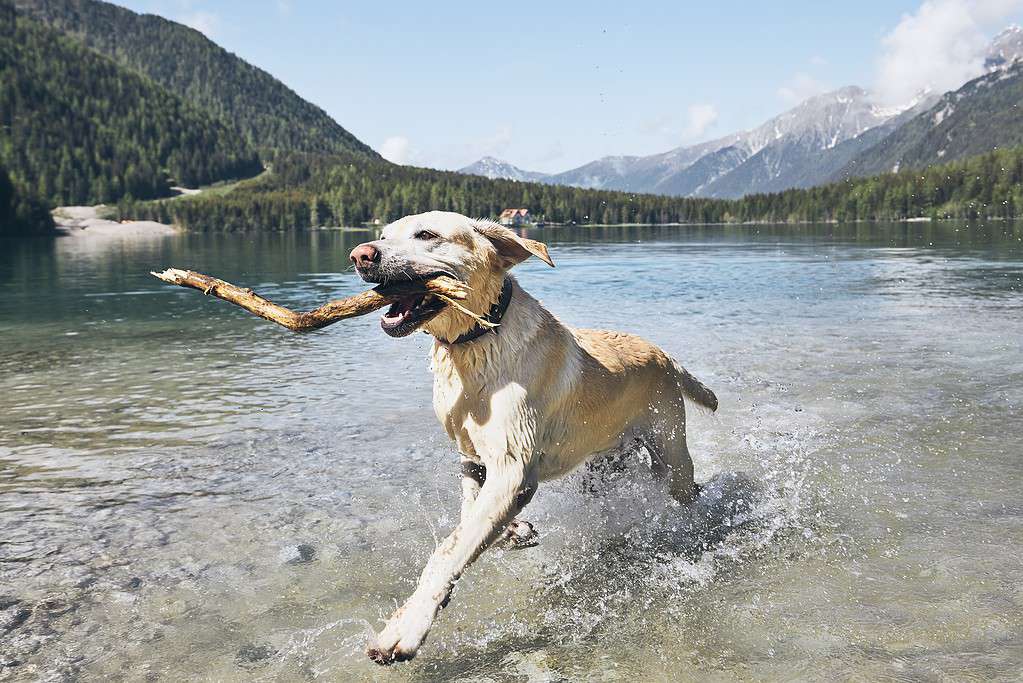
Dogs can get into all kinds of situations that result in unusual smells.
©Chalabala/iStock via Getty Images
#1 Get Your Dog Evaluated by the Vet
Anytime you detect a fishy odor that doesn’t go away, it’s important to bring your dog to the vet for evaluation. The anal glands can become impacted, infected, or develop an abscess. All of these conditions can be very painful for your dog and come with an increased risk for serious illness. If you don’t treat them early, they can get worse and might require surgery. Fortunately, if you catch it early, your vet can often treat it right in the office to dislodge any blockage and provide immediate relief to your dog. Your vet will likely express your dog’s anal glands manually to get things moving again.
One sign that your dog’s anal glands are bothering them is that they scoot their bottom on the floor. Doing this can provide some relief, although as the problem gets worse, they’re more likely to shy away from any contact in that area. If you notice a fishy smell and see your dog scooting, it’s time to get the vet to check out the area to make sure it’s okay.
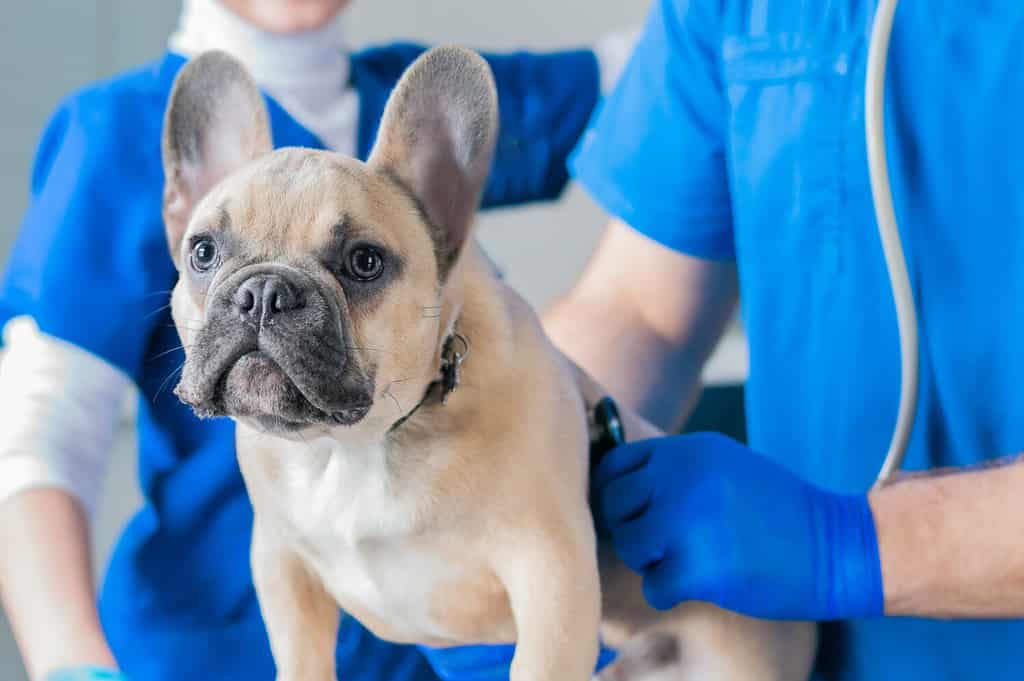
Your vet can check out your dog’s health and make sure that any strange smells don’t indicate an underlying health condition.
©Andy Gin/Shutterstock.com
Removing the Anal Glands
In some cases, your vet may recommend removing your dog’s anal glands. This is most often the recommended course of treatment for a tumor. If they have repeated problems that don’t improve with other changes, removing the anal glands may also be considered. Of course, each situation is different and the best advice comes from your vet who can evaluate your pup and track this issue over time.
#2 Treat Your Dog’s Anxiety
Because anal gland secretions are stronger when your dog is nervous, it’s normal for them to smell fishier in new situations. This is especially true for dogs who are prone to being nervous. A dog who isn’t used to other dogs, for example, may have more anal gland secretions when they go to a new dog park. This is normal and should be resolved once they are back in their familiar surroundings.
If it happens often, you might want to consider treating your dog’s anxiety with medication or specialized training. Just like people can have physical symptoms and problems related to anxiety, dogs can, too. Untreated anxiety can cause other health issues, such as blood pressure and hormone problems, not to mention the ongoing fishy smell. If anxiety is the underlying cause of the increased anal secretions, treating that can help your dog feel more comfortable and result in less fishy smells.

It’s important to address your dog’s separation anxiety so they don’t become distressed or destructive.
©GoodFocused/Shutterstock.com
#3 Introduce a High-Fiber Diet
If your dog has a history of anal gland impactions or problems, a high-fiber diet can keep them from reoccurring in some cases. Anal glands are normally secreted each time your dog goes Number 2. But if they have loose stools, it may not trigger this response, leading to impaction. A high-fiber diet helps keep their digestion moving the way that it should and reduces loose stools. This will help the anal glands function as they should.
Obesity in dogs can result in loose, unformed stools or other issues with the anal glands. Keeping your dog in a healthy weight range can help prevent future health problems, including anal gland issues. Include regular exercise in your dog’s routine.

Dog food is food specifically formulated and intended for consumption by dogs and other related canines.
©Africa Studio/Shutterstock.com
#4 Brush Their Teeth
Some foods can cause fishy-smelling breath. If the smell is concentrated around their mouth, it might be something that is in their diet. Most dog foods don’t have a strong fishy smell. But, if your dog enjoys your leftovers, that could be the culprit. Brush their teeth or give them a dental chew treat to see if that takes care of the problem. You can also try to keep track of what they eat. See which foods are giving them such stinky breath.
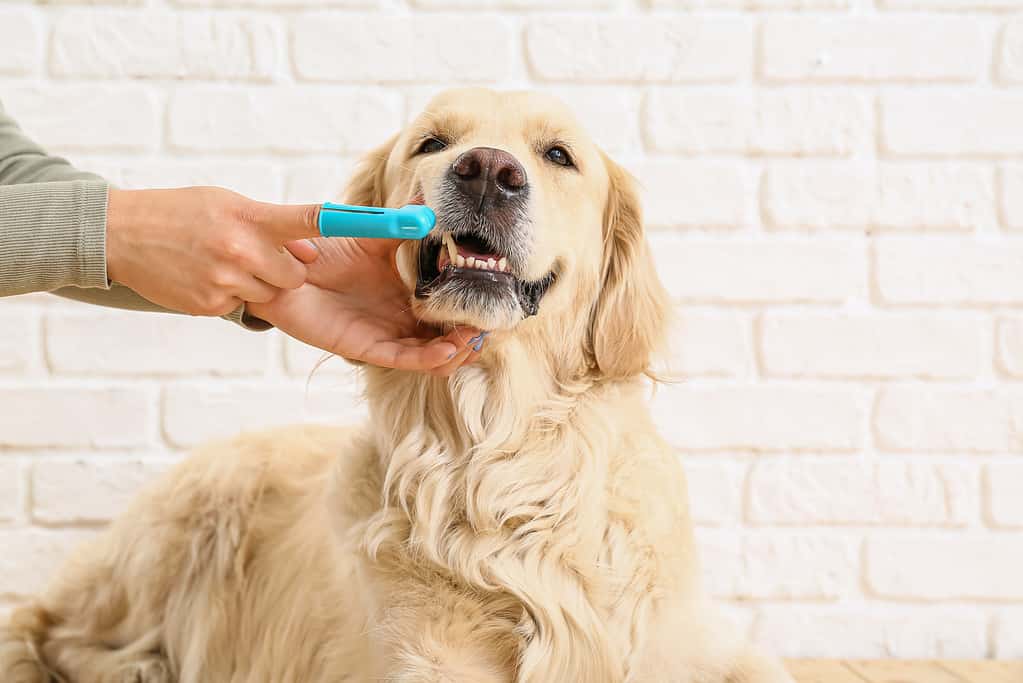
If your dog eats something unusual, it can result in unexpected bad breath.
©Pixel-Shot/Shutterstock.com
#5 Wipe Their Rear
Specialized wipes help deal with overactive anal glands that can produce a fishy smell. These can be very helpful to have on hand if you know that you’re getting ready for a situation that might make your dog nervous. Traveling, moving, and leaving your dog with a sitter can all cause some nervousness. Bringing a new pet or family member into the home is also a major change for your dog. Even the most even-keeled pup gets nervous occasionally. If they are secreting more from their anal glands and it is bothering you or them, give them a quick wipe to remove any excess secretions. Just be sure to keep your nose tuned for recurring smells. If it happens often, there may be a bigger problem to address.
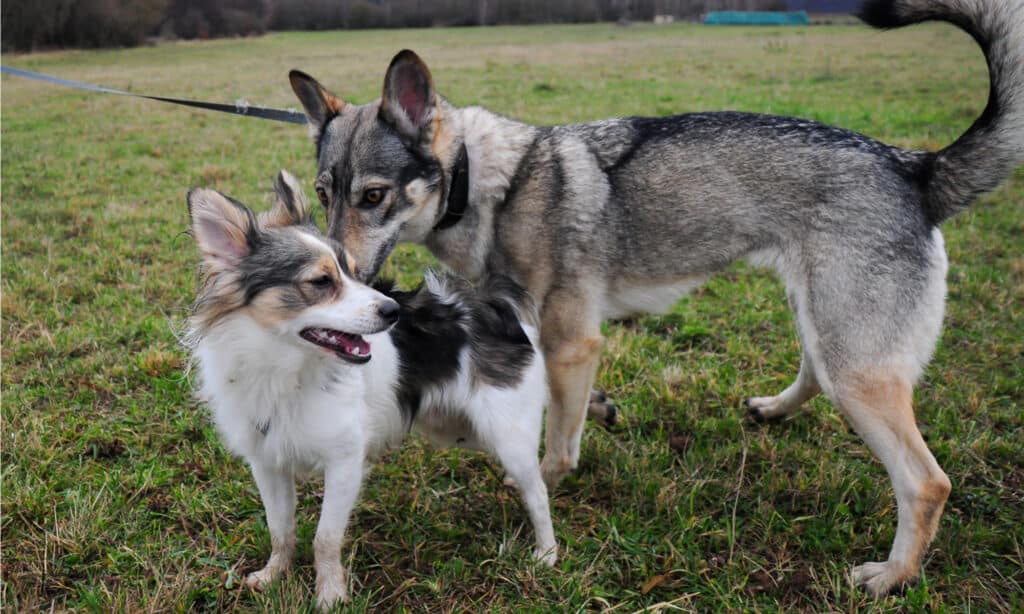
Dogs often sniff each other near the rear to learn the other dog’s scent.
©Marek Rybar/Shutterstock.com
#6 Give Your Dog a Bath
Giving your dog a bath may seem like a simple answer and that’s because it is. A good bath can temporarily relieve just about any smell. If your dog has rolled in something fishy, this helps get the substance off their skin and fur. If your dog had higher or stronger than normal anal gland secretions, a bath can wash off the actual substance from their rear end area. But it is still important to note that it doesn’t address the underlying cause of the smell. If you give your dog a bath and notice the smell again shortly after, it’s likely an issue with their bodies and not something that they ate or came into contact with.
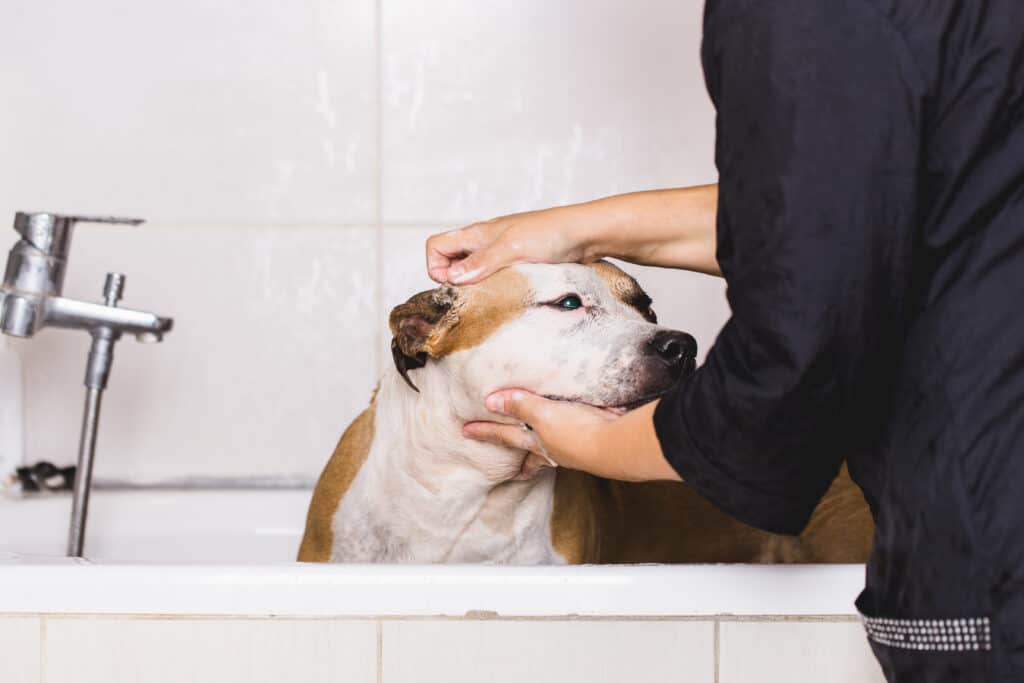
Bathing your dog will not only help with any bad smells, but it will keep your dog healthy and help you watch for any potential injuries or infections.
©iStock.com/DuxX
| Number | Tip to Get Rid of Smells |
| 1 | Get Your Dog Evaluated by the Vet |
| 2 | Treat Your Dog’s Anxiety |
| 3 | Introduce a High-Fiber Diet |
| 4 | Brush Their Teeth |
| 5 | Wipe Their Rear |
| 6 | Give Your Dog a Bath |
The photo featured at the top of this post is © Dorottya_Mathe/iStock via Getty Images
Ready to discover the top 10 cutest dog breeds in the entire world?
How about the fastest dogs, the largest dogs and those that are -- quite frankly -- just the kindest dogs on the planet? Each day, AZ Animals sends out lists just like this to our thousands of email subscribers. And the best part? It's FREE. Join today by entering your email below.
Thank you for reading! Have some feedback for us? Contact the AZ Animals editorial team.







